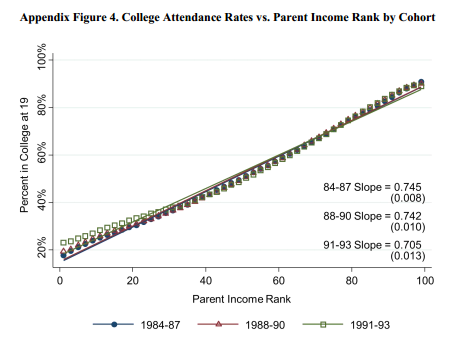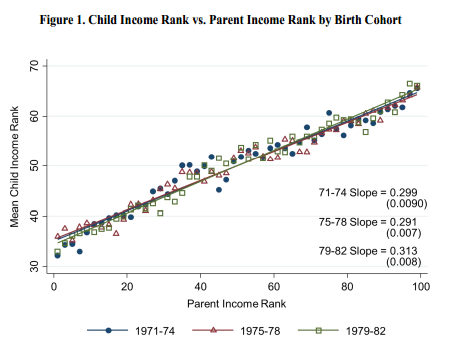Returning to the Megan McArdle saga, I want to make a point about intergenerational class entrenchment that does not really come out of the other posts so far. So here goes.
One of the interesting things about conservatives is that they seem to often sympathize with poor children in this country, but clearly have little to no sympathy for poor adults. Bryan Caplan says so explicitly, which is rare. But even where it’s not said, I don’t think it’s terribly bold of me to claim that this sympathy differential is present.
What’s curious about this differential, on the merits, is that actual human lives are continuous and poor childhood bleeds into poor adulthood:


Not all poor kids wind up as poor adults obviously, but you can’t seriously look at these aggregate figures and not see pretty straightforward life-cycle class continuities. If poor children are sympathetic for some reason owing to unluck, then it’s hard to understand why poor adults seem to elicit so much disdain and disparagement when it’s clear that the unluck of being born poor doesn’t disappear at age 18.
What’s so frustrating about really upper class kids who go on to become elite pundits and write stupid stuff about this topic is that, had they any self-awareness whatsoever, they should know all about intergenerational class entrenchment. In most cases, their parents have done everything they can to make sure social mobility remains a myth.
Megan McArdle’s parents didn’t send her to one of the most expensive private prep schools in the country for nothing. That wasn’t some random decision. They did it to give McArdle an edge. The point of this edge is to ensure that McArdle out-competes others in her age cohort (in particular those who cannot afford such schools) for the scarce number of high-ranking economic and social positions. This is why they paid for McArdle’s Ivy League undergraduate degree at the University of Pennsylvania as well. That is why many other rich parents pay for extra tutoring, pay for SAT prep courses, and hire college admissions helpers. That is why they use their knowledge of the college entrance system to make sure their kid is doing the right things starting in grade 9 to win out over others.
Entrenching class position across generations is also why parents seem to get extra generous to their alma mater college when their kids hit their teenage years (legacy admission gaming). It’s why parents help their kids with professional contacts when they can and pull whatever other connections they have to make sure their kids have the best shots in life.
From womb to adulthood, rich parents are carefully working to make sure those graphs above (especially the second one) come out looking that way. If you think I am just cynical about this, have a listen to Dinesh D’Souza on the topic:
Why are we doing these things? We are, of course, trying to develop her abilities so that she can get the most out of life. The practical effect of our actions, however, is that we are working to give our daughter an edge–that is, a better chance to succeed than everybody else’s children. Even though we might be embarrassed to think of it this way, we are doing our utmost to undermine equal opportunity. So are all the other parents who are trying to get their children into the best schools, the best colleges, and in general give them the best possible upbringing and education. None of them believes in equal opportunity either!
Rich parents work to destroy equal opportunity and social mobility as best they can. That’s understandable in many ways and not terribly surprising either (player v. game, etc.). What is surprising though is the almost total lack of sympathy the beneficiaries of this class reproduction machine–rich kids–often display with regards to the poor kids who come out the other end of this rigged game as poor adults.
The rich kid pundits like McArdle are the most heinous of this bunch because it is literally their job to try to convince everyone that we should construct our distributive institutions so as to deny things like health insurance and adequate income to the poor adults that their parents did their best to create.